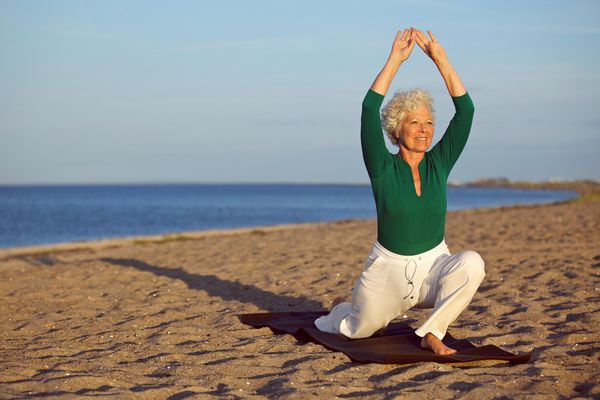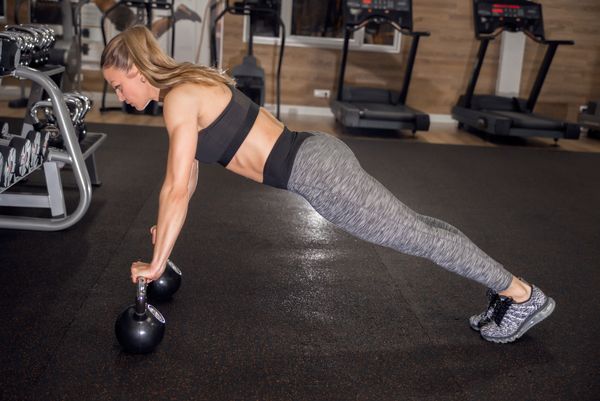Your heart is just waiting for you to help it get stronger. Oh, sure, there may be more visible parts of your body that could use a little conditioning—those upper arms, perhaps, or the rear end that seems to be losing its battle with gravity.
It's easy to forget about what you can't see, like your heart. But when you pay attention to it and pump it up—by increasing your cardiovascular endurance through exercise—you improve the likelihood that you'll have a long, healthful life.
With better heart endurance, you lower your risk of developing diabetes, heart disease, high cholesterol, or high blood pressure. If you already have those conditions, a stronger heart will help decrease their severity.
A stronger heart supports your effort to become more physically active and lose weight—both of which lower your mortality risk. Better cardio endurance also helps protect women from falls and injury, risks that increase for us with age.
You can do a lot to build up your heart's endurance, regardless of your shape, physical strength or age. And February, American Heart Month, is the perfect time to get going.
"Endurance" is not a scary word
Right now, you may be thinking, "Endurance? That's for marathon runners, mountain climbers, and athletes with no body fat—not for people like me!"
To many of us, the word "endurance" implies hardship, pain and suffering, or the extreme physical exertion of intensely competitive athletes. Well, fear not: when your cardiac endurance is good, it simply means you have enough stamina to do the daily activities you want to do, with some energy left over.
"If you don't have any endurance, then you're going to be fatigued at the end of the day," says Sharonne N. Hayes, M.D., F.A.C.C., a cardiologist and director of the Mayo Clinic Women's Heart Clinic, in Rochester, MN.
Having good cardiac endurance lets you:
- Enjoy a book club meeting after a hard day's work.
- Take a long weekend hike with your family and not need time to recover from the effort.
- Haul six bags of mulch from your car's trunk to your flower beds.
- Run through the airport to catch a departing flight without feeling dizzy or so breathless that you need to sit down.
With better cardiac endurance, sudden stresses aren't as challenging. "It's doing what you need to do and actually being able to do a little more," Hayes says. "So, if you had to hurry to get out of the way of a car, you could do a little extra for a short period of time as well."
Building up your heart
When you promote endurance through moderate-intensity cardio exercise, you push your heart to work a little bit harder than normal. That increases the number of heartbeats per minute during the activity and strengthens the heart's contractions.
As a result, your heart pumps more blood, which enables more oxygen (contained in the blood) to flow through your heart and lungs. More oxygen also travels to other tissues in your body, such as muscles.
This physical process develops your cardiac strength bit by bit. By gradually increasing the amount of work you give your heart, you help expand its stamina. The more your heart does, the more it is able to do.
"You're making your heart and the receiving tissues more efficient," Hayes says. "If you walk regularly, then the muscles in your legs become more efficient at utilizing the blood flow. That decreases the amount of work the heart has to do, allowing you the next week to walk a little faster or walk a little farther."
For those who haven't been physically active, "you probably want to keep the intensity fairly low for some weeks until you begin to improve fitness," says Christopher C. Dunbar, Ph.D., M.P.H., professor and director of the Laboratory of Applied Physiology at Brooklyn College of the City University of New York. Dunbar's research has shown that postmenopausal women can increase cardiac endurance and sustain a healthy level through their own perceptions of exercise effort.
According to cardiologist Hayes, even patients with heart failure or damaged hearts have been shown to benefit from exercise that develops endurance. Such activity—once forbidden to heart patients—may significantly improve their symptoms and quality of life.
Simple ways to build endurance
- If you're just starting to walk in 5- or 10-minute sessions, add extra walks into your schedule. Aim to walk five days a week.
- When those walks begin to feel easy, increase the time length of each. As your endurance develops, you may be able to walk for 20 or 30 minutes without resting—and without feeling exhausted afterwards.
- Once you're taking regular walks, encourage even better cardiac endurance by increasing the speed at which you're walking. You want to achieve a brisk, moderately intense pace.
- Do you exercise on a treadmill at home or in a gym? Have you been walking at the same pace for several months? Increase the treadmill's speed by a few tenths of a mile. Or change the elevation angle of the belt by one or two degrees, especially if you've been walking with it set flat.
- Try swimming. Use the same bit-by-bit approach to build your endurance.
- Adding short bursts of increased effort during your regular exercising also helps build endurance. If you're walking, add two or three minutes of running in the middle of your session. While swimming, add a lap or two of a harder stroke, such as freestyle.
- Looking for something different to boost endurance? Try a beginner's step aerobics class, go dancing or take a bicycle ride.
- After you've been doing cardio exercise regularly, consider using weights once or twice a week. Exercising with weights builds strength for endurance activities and counteracts the bone loss many women experience as they age.
- Worried that you might be exercising too hard? The "talk test" is one way to check. While exercising, if you can carry on a long conversation, "you're not pushing yourself hard enough," Hayes says. "On the other hand, if you're panting so hard that you can barely answer in one syllable, then you're pushing it too hard." Aim for exertion that lets you speak only in brief, three- or four-word sentences.
Remember, check with your doctor first before beginning any new strenuous exercise plan.







